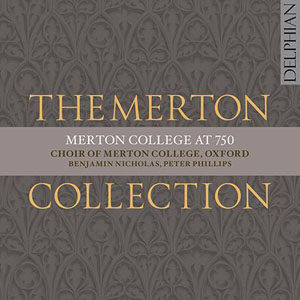This recording features first rate performances of, on the “modern” side, Eriks Ešenvalds’ Magnificat and Nunc dimittis, Arvo Pärt’s The Woman with the Alabaster Box, and Ola Gjeilo’s Sacred Origins–and equally excellent versions, on the “early” side, of William Byrd’s Praise our Lord, all ye gentiles, John Sheppard’s Libera nos, salva nos I and William Mundy’s own Magnificat and Nunc dimittis setting–enough to please any choral music fan. But there’s plenty more to satisfy in this collection compiled to celebrate the 750th anniversary of the founding of Merton College in 1264, including perfectly executed renditions of the two most popular and oft-recorded (and easily mangled) of Charles Stanford’s three Op. 38 motets, Justorum animae and Beati quorum via (happily leaving out the cumbersome and “unlovely” Coelos ascendit hodie), and Hubert Parry’s There is an old belief (from his also well-loved and oft-recorded set of motets, Songs of Farewell).
Interestingly, in spite of its very long history, there wasn’t even a choir at Oxford’s Merton College until 2006–but on evidence here (and on several other recordings in its growing catalog on Delphian), the 30-voice mixed ensemble has favorably distinguished itself among those much older and better-known Oxford and Cambridge institutions. No doubt much of this success is attributable to music director Benjamin Nicholas and to the support of the college, which seems to have embarked on an ambitious program of commissions (a project known as the Merton Choirbook), touring, and recordings. Nicholas is joined here by conductor Peter Phillips (yes, that Peter Phillips, founder of the Tallis Scholars) who holds a music director position at the college and who conducts the program’s “early” repertoire.
The disc includes three commissioned works–the Ešenvalds and Gjeilo, and James Lavino’s Beati quorum via, a gorgeous setting of the familiar text, a highlight of the recording and a piece that, along with those other two, should enjoy a substantial following from choirs everywhere. Programs like this, covering such a wide historical range, often don’t cohere. This one impresses as a well-conceived concert program, consisting of works that, while different in style are musically compatible and are organized in a way that make a happy, and eminently repeatable, listening experience.
































